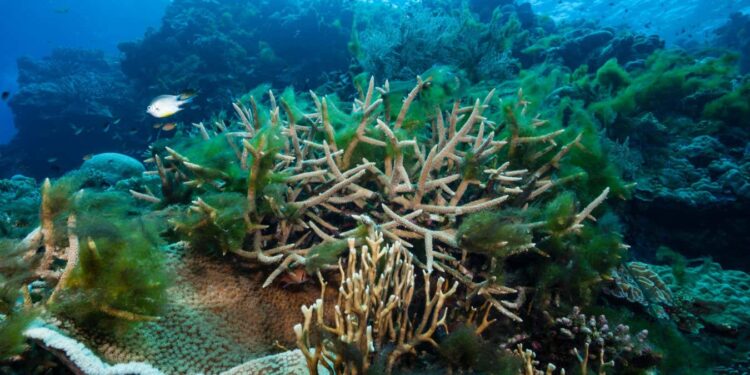
Coral reefs are being severely damaged by climate change
WaterFrame/Alamy
A recent surge in ocean temperatures has caused the widespread bleaching and death of warm-water corals around the world, officially triggering the first climate tipping point for one of Earth’s ecosystems, scientists have declared.
The collapse of one of the world’s most diverse and fragile ecosystems poses a “human health and security hazard” that governments are unprepared for, warns Melanie McField at Healthy Reefs for Healthy People, a conservation programme in Florida run by the US Smithsonian Institution.
Warm-water coral reefs support up to one-third of all known marine biodiversity and provide food, coastal protection and a source of income for up to a billion people around the world. Reef services contribute up to 9.9 trillion dollars annually in goods and services worldwide.
Yet corals are highly sensitive to changes in water temperature. Record-breaking global temperatures documented since 2023 have pushed ocean heat levels to new highs, triggering a mass bleaching event that has affected more than 80 per cent of all the world’s corals. Bleaching is when corals expel the algae living in their tissues in response to high water temperatures, which turns them white. This leaves corals vulnerable to disease, and prolonged bleaching can kill them off altogether by depriving them of their primary food source.
The latest bleaching event has been a “different order of magnitude” to anything scientists have previously witnessed, says McField. “We’re in the tipping point,” she confirms. This is generally defined as a critical threshold that, if passed, could cause dramatic and probably irreversible changes in the climate system.
McField was one of the authors of the chapter on corals in the Global Tipping Points Report 2025, released today. The report, the first update since 2023, is compiled by 160 scientists from around the world and co-ordinated by the University of Exeter in the UK and campaign group WWF. It warns that warm-water corals are the first Earth system to cross over into their tipping point and are now in the throes of an “unprecedented crisis”.
Central academic estimates suggest that the thermal limit of warm-water corals is reached when global atmospheric temperatures hit 1.2°C above pre-industrial levels, with an upper threshold of 1.5°C. In 2024, global average temperatures exceeded 1.5°C above pre-industrial levels for the first time in recorded human history, an event that has pushed the world’s coral reefs beyond the limits of their endurance, according to Tim Lenton at the University of Exeter, who led the report.
“We’ve taken a sample of the 1.5°C world, and we have seen the consequences,” he told reporters at a press briefing ahead of the report’s launch. “A majority of coral reefs are under risk of extensive dieback [or bleaching] and tipping into the alternative seaweed-dominated, algal-covered state.”
The best hope of saving the world’s warm water corals from almost complete extinction now lies in bringing global average temperatures down to 1.2°C above pre-industrial levels as soon as possible, he says. Whether or not such an ambitious goal – which goes well beyond the demands of even the 1.5°C temperature target – is feasible to achieve is a separate question, says Lenton.
Terry Hughes at James Cook University in Australia warns there are now “almost no unbleached reefs left anywhere in the world”. But the situation can still be mitigated. “Where coral reefs end up in the next few decades is under our control, if global greenhouse gas emissions are rapidly curtailed,” he says.
Often the point at which climate tipping points could be triggered is highly uncertain, but researchers warn the widespread decline of the Amazon rainforest, the melting of polar ice sheets and the collapse of the crucial AMOC ocean current could all happen at warming levels below 2°C.
But people can also trigger “positive tipping points” to mitigate the risk, Lenton stresses, highlighting the exponential growth of renewable energy over the past decade and the rapid take-up of electric vehicles. Rapid adoption of cleaner technologies has the potential to deliver emissions cuts at the scale needed to keep warming below 2°C, the report notes.
In a statement, Lenton said urgent action is needed from world leaders at the upcoming COP30 summit in Brazil to accelerate emissions cuts across the global economy and minimise the amount of time global temperatures spend above 1.5°C. “We are rapidly approaching multiple Earth system tipping points that could transform our world, with devastating consequences for people and nature. This demands immediate, unprecedented action from leaders at COP30 and policy-makers worldwide,” he said.
Topics:
Source link : https://www.newscientist.com/article/2499583-coral-reefs-are-at-a-tipping-point-after-surging-global-temperatures/?utm_campaign=RSS%7CNSNS&utm_source=NSNS&utm_medium=RSS&utm_content=home
Author :
Publish date : 2025-10-13 00:01:00
Copyright for syndicated content belongs to the linked Source.












